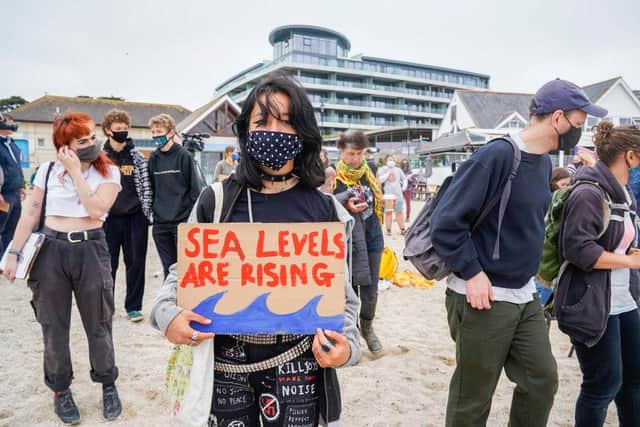Revealed: Government yet to achieve 88% of key climate recommendations made in 2020
and live on Freeview channel 276
The government is yet to achieve 88% of the key climate recommendations set out to them in a 2020 report, it has been revealed.
The recommendations were made by the Climate Change Committee in their 2020 progress report to Parliament, which outlined urgent actions the Government must take to cut emissions and adapt for a warming climate.
Advertisement
Hide AdAdvertisement
Hide AdOf the 92 recommendations made to the Government in 2020, just 11 have been fully achieved, the committee revealed in their 2021 progress report.


The recommendations included implementing plans for making public buildings and vehicle fleets zero carbon, reforming Vehicle Excise Duty and publishing a manufacturing and construction decarbonisation strategy.
Though 72 of the 92 recommendations (over 75%) have either been achieved, partially achieved or are underway, the Climate Change Committee stated in their 2021 report that just 11 being completed indicates that progress is “not happening at the necessary pace”.
Some of the recommendations fully achieved include the setting of the sixth carbon budget and confirming the ban on sales of new petrol and diesel cars for 2032.
Advertisement
Hide AdAdvertisement
Hide AdEnsuring Ofcom guidelines take into account best practice in communicating climate change, supporting local government to play a full role in the net zero transition and monitoring the CO2 impacts of aviation, however, have not been acted on since the recommendations were made.
The 2021 progress report, delivered to Parliament on Thursday, has outlined a fresh series of climate recommendations for the government.
The report also analysed the UK’s progress in tackling climate change so far.
While praising the scale of the Government’s ambitions on climate, the committee said there was a wide gap between those ambitions and actual strategy for achieving them.
Advertisement
Hide AdAdvertisement
Hide Ad“It is hard to discern any comprehensive strategy in the climate plans we have seen in the last 12 months. There are gaps and ambiguities,” they wrote.
“Climate resilience remains a second-order issue, if it is considered at all. We continue to blunder into high-carbon choices. Our planning system and other fundamental structures have not been recast to meet our legal and international climate commitments,” they added.
The report suggested that only a handful of UK sectors currently have “strong plans to adapt to the current and future climate”, and some, like agriculture and aviation, have made little progress on cutting emissions.
The report said some government departments are “not sufficiently prioritising climate change”, while “none” are moving at “the pace required”.
Advertisement
Hide AdAdvertisement
Hide AdThe committee has made approximately 200 recommendations to the Government in their 2021 report, though seven priority areas have been outlined.
These include developing and implementing a policy package for both the 2030 transition to electric vehicles and decarbonisation of buildings, and delivering a hydrogen strategy for the path to net zero.
Lord Deben, Chairman of the Climate Change Committee said: “We are in the decisive decade for tackling climate change. The Government must get real on delivery. Global Britain has to prove that it can lead a global change in how we treat our planet.
“Get it right and UK action will echo widely. Continue to be slow and timid and the opportunity will slip from our hands. Between now and COP 26 the world will look for delivery, not promises.”
Advertisement
Hide AdAdvertisement
Hide AdThe UK Government has rejected the claim that they have been slow to act on the climate crisis.
A government spokesperson said: “Any suggestion we have been slow to deliver climate action is widely off the mark.
“Over the past three decades, we have driven down emissions by 44% - the fastest reduction of any G7 country – and set some of the most ambitious targets in the world for the future, whilst driving forward net zero globally through our COP26 presidency.
“In recent months, we’ve made clear, tangible progress, with record investment in wind power, a new UK Emissions Trading Scheme, £5.2 billion investment in flood and sea defences, clear plans to decarbonise heavy industry and North Sea oil, and businesses pledging to become net zero by 2050 or earlier.”
Comment Guidelines
National World encourages reader discussion on our stories. User feedback, insights and back-and-forth exchanges add a rich layer of context to reporting. Please review our Community Guidelines before commenting.
